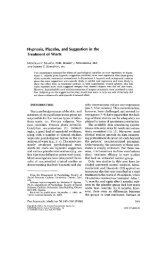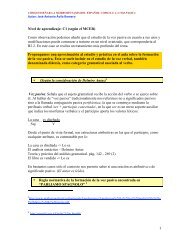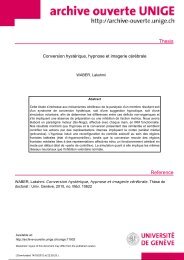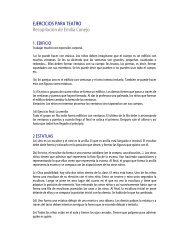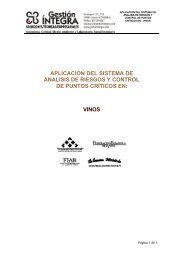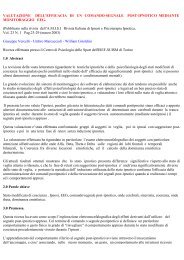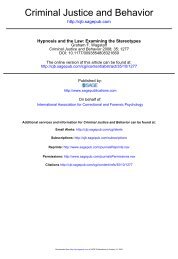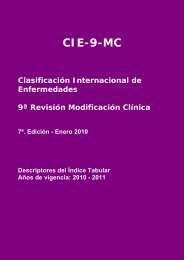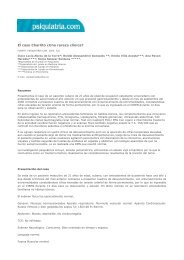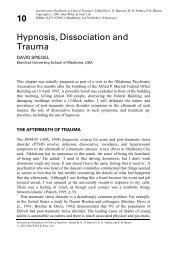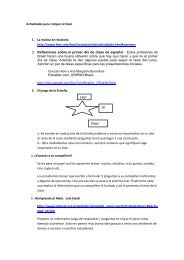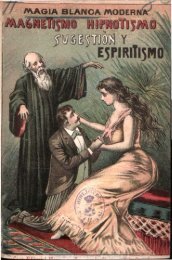Orne, M.T. The use and misuse of hypnosis in court. International ...
Orne, M.T. The use and misuse of hypnosis in court. International ...
Orne, M.T. The use and misuse of hypnosis in court. International ...
You also want an ePaper? Increase the reach of your titles
YUMPU automatically turns print PDFs into web optimized ePapers that Google loves.
<strong>Orne</strong> 1979 IJCEHhttp://www.sas.upenn.edu/psych/history/orne/orneijceh19794311341.html11 de 23 19/03/2012 17:24more details than a narrative. By the same token, as the work summarized by Hilgard <strong>and</strong> L<strong>of</strong>tus (1979)has <strong>in</strong>dicated, it will result <strong>in</strong> vastly lowered accuracy <strong>of</strong> the material that is obta<strong>in</strong>ed. Further, such aprocedure maximizes the potential <strong>in</strong>put <strong>of</strong> the hypnotist about what is wanted, mak<strong>in</strong>g it even more likelythat the subject's memories will more closely resemble the hypnotist's prior conceptions than wouldord<strong>in</strong>arily be the case.7Unfortunately, no mean<strong>in</strong>gful research is available to document the relative merit <strong>of</strong> facilitat<strong>in</strong>g thereliv<strong>in</strong>g <strong>of</strong> a traumatic event versus the attempt to prevent the affect from be<strong>in</strong>g relived by us<strong>in</strong>g specificsuggestions <strong>and</strong> questions to <strong>in</strong>crease the amount <strong>of</strong> memory-like material be<strong>in</strong>g brought forth.Considerable experience <strong>in</strong> the cl<strong>in</strong>ical <strong>and</strong> forensic <strong>use</strong> <strong>of</strong> age regression <strong>and</strong> related techniques suggeststhat the patient has a higher likelihood <strong>of</strong> produc<strong>in</strong>g uncontam<strong>in</strong>ated memories if allowed to <strong>in</strong>itially relivethe events without much question<strong>in</strong>g by the hypnotist. Further details can then be elicited by question<strong>in</strong>gthe second or third time the material is brought forth. It is <strong>in</strong>terest<strong>in</strong>g that the <strong>in</strong>terrogation techniqueadvocated by L<strong>of</strong>tus (1979), based on an entirely different body <strong>of</strong> data with wak<strong>in</strong>g eyewitnesses, isremarkably similar to that which evolved with hypnotic subjects.<strong>The</strong> Effect <strong>of</strong> the Hypnotic Context on Refresh<strong>in</strong>g <strong>of</strong> MemoryWhile the effect <strong>of</strong> <strong>hypnosis</strong> is most clear-cut <strong>in</strong> the realm <strong>of</strong> memory when one is deal<strong>in</strong>g withcircumscribed areas <strong>of</strong> pathological amnesia, the dramatic lift<strong>in</strong>g <strong>of</strong> amnesia (with which most laymen arefamiliar from its portrayal <strong>in</strong> films, novels, <strong>and</strong> the media), is the exception rather than the rule. With the<strong>in</strong>creas<strong>in</strong>g <strong>use</strong> <strong>of</strong> <strong>hypnosis</strong>, particularly with <strong>in</strong>dividuals without any obvious memory disturbance <strong>and</strong>without the ability to enter pr<strong>of</strong>ound <strong>hypnosis</strong>, the clear demarcation between effects specific to <strong>hypnosis</strong><strong>and</strong> what may occur <strong>in</strong> everyday <strong>in</strong>terroga-7 It is, <strong>of</strong> course, quite <strong>use</strong>ful at times to <strong>use</strong> metaphors such as "stopp<strong>in</strong>g a videotape" <strong>and</strong> "<strong>in</strong>stantreplay" when work<strong>in</strong>g with <strong>hypnosis</strong>. However, no competent hypnotherapist would, <strong>in</strong> us<strong>in</strong>g such ametaphor, conf<strong>use</strong> it with the manner <strong>in</strong> which memory is organized. He would also recognize that he isputt<strong>in</strong>g great pressure on the subject to produce someth<strong>in</strong>g, <strong>and</strong> the greater the pressure, the more likelythe development <strong>of</strong> guided confabulations.326 MARTIN T. ORNEtion with unhypnotized <strong>in</strong>dividuals becomes blurred. While there is no doubt that the k<strong>in</strong>d <strong>of</strong> processes<strong>in</strong>volved <strong>in</strong> <strong>hypnosis</strong> can also be shown to occur under many other circumstances <strong>and</strong> that the basic lawsgovern<strong>in</strong>g human memory are not negated beca<strong>use</strong> the <strong>in</strong>dividual is hypnotized, it would be quite wrong,however, to assume that the hypnotic procedure br<strong>in</strong>gs about no important changes.Some advocates <strong>of</strong> the wide <strong>use</strong> <strong>of</strong> "forensic <strong>hypnosis</strong>" have argued that we need not be concerned aboutthe k<strong>in</strong>ds <strong>of</strong> issues that have been described earlier, beca<strong>use</strong> these problems occur even <strong>in</strong> the wake state<strong>and</strong> are certa<strong>in</strong>ly negligible if the subject is only relaxed <strong>and</strong> not deeply hypnotized. It is ironic that thisk<strong>in</strong>d <strong>of</strong> disclaimer is made by the very <strong>in</strong>dividuals who tout the unique effectiveness <strong>of</strong> <strong>hypnosis</strong> as an aidto crim<strong>in</strong>al <strong>in</strong>vestigation. One cannot have it both ways! <strong>The</strong> reason why <strong>hypnosis</strong> is <strong>use</strong>d as a forensictool is that it is effective <strong>in</strong> elicit<strong>in</strong>g more details. This is so even with <strong>in</strong>dividuals who are not particularlyhypnotizable, but who cooperate <strong>in</strong> the hypnotic situation. It is be<strong>in</strong>g <strong>in</strong> the hypnotic situation itself thatmay pr<strong>of</strong>oundly alter some aspects <strong>of</strong> the subjects' behavior <strong>and</strong> experience (London & Fuhrer, 1961).Thus, there is a strong expectancy that <strong>hypnosis</strong> will facilitate recall. <strong>The</strong> subject <strong>in</strong> the hypnotic situationfeels relaxed <strong>and</strong> less responsible for what he says s<strong>in</strong>ce he believes that the hypnotist is both an expert<strong>and</strong> somehow <strong>in</strong> control. <strong>The</strong> hypnotist <strong>in</strong> turn makes certa<strong>in</strong> that the subject cannot "fail." Hypnotictechnique <strong>in</strong>volves the extensive <strong>use</strong> <strong>of</strong> re<strong>in</strong>forcers through frequent verbalizations, such as, "Good,""F<strong>in</strong>e," "You are do<strong>in</strong>g well," <strong>and</strong> so on, which are novel, satisfy<strong>in</strong>g, <strong>and</strong> reassur<strong>in</strong>g, particularly <strong>in</strong> apolice <strong>in</strong>terrogation situation. Not surpris<strong>in</strong>gly, the subject wants to ma<strong>in</strong>ta<strong>in</strong> the level <strong>of</strong> approbation;consequently, when the hypnotist stops his expressions <strong>of</strong> approval (simply by omitt<strong>in</strong>g to say "Good"), he



